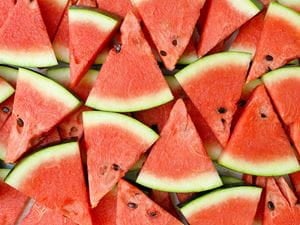
The summer sun is shining, and the breeze smells of grass and flowers. Summer has arrived!
What better way to kick off the warmest season than with a cookout, and what picnic is complete without the inclusion of everyone’s favorite natural dessert—watermelon.
Classified, surprisingly, as a vegetable by the USDA, but having many fruit-like traits watermelon has been a favored food since the time of ancient Egypt, where depictions of the plant can be found in hieroglyphs. China produces most of the world’s watermelon—about 70 million metric tons a year.
There’s more to watermelon that mere water and sugar, however. They’re also a very nutrient-dense food, and entire watermelon—rind, seeds and all—is edible. The nutritional benefits of watermelon can be surprising, especially when most consider it a simple, sweet snack, composed mostly of water. So read on and learn about 5 health benefits of watermelon.
Lots of Lycopene
Most of us have heard of the health benefits of lycopene—commonly associated with tomatoes, it’s a phytonutrient that is beneficial to our cardiovascular health, and possibly our bone health, according to recent studies. It is the substance which gives fruits and vegetables a red color, and is found in pink grapefruit, apricots, pink guavas, watermelon, and tomato products. It is a powerful antioxidant that helps protect our cells from damage, and is most well-known for stopping LDL cholesterol from being oxidized by free radicals and, consequently, turned into arterial plaque.
Watermelon is an excellent source of lycopene, with about 6,500 milligrams in half a cup, and currently, is the most common source of all dietary lycopene for Americans. The American Cancer Society does not publish a minimum recommended intake for lycopene, but it does recommend eating at least five servings of deeply colored fruits and vegetables each day to receive the health benefits of the associated antioxidants.
With watermelon being as delicious and easy to eat as it is, there’s no reason not to pile on the lycopene that gives watermelon its familiar burst of color this summer, and protect your cardiovascular system.
Inflammation Prevention
Watermelon contains choline, a nutrient that promotes quality sleep, and that aids in functions such as muscle movement, learning, and memory. Involved in many chemical reactions in the body, it is considered an essential nutrient, and its ability to prevent many different disorders is widely documented.
Choline also acts as an anti-inflammatory. Studies show that people with diets rich in choline have the lowest levels of inflammatory markers in their blood. Inflammation—the body’s natural immune reaction—can be deadly when it becomes chronic. Chronic inflammation can lead to a variety of symptoms, some of which are brain fog, emotional imbalances, gastrointestinal problems, joint issues, and cardiovascular issues.
Watermelon is a tasty way to get more of this essential nutrient, and every part of the watermelon contains it. Keep your summer healthy by engaging in plenty of physical activity, eating a balanced diet, and incorporating plenty of inflammation-destroying choline from that refreshing slice of watermelon.
Hydration
Everyone loves variety. This, however, is sometimes a problem when it comes to hydration. After a while, people get bored of water, and in the summer heat, this can be deadly. Instead, they ignore their thirst or, just as badly, drink coffee or alcohol, which can actually cause dehydration.
Some of the symptoms of dehydration are dry mouth, sleepiness, thirst, dry skin, headache, and dizziness—if you feel any of these symptoms, drink fluids immediately and get to a cooler area, if possible. If you cannot keep the fluids down, seek medical help immediately.
The great thing about watermelon, though, is that it’s a different and exciting way to get more water in your body, encouraging everyone to stay more hydrated. Made up of approximately 91.5 percent water, according to the USDA, and filled with beneficial electrolytes, watermelon is a great snack for the hottest days of summer. Watermelon cannot replace fluid consumption, but it can certainly supplement it, making it even less likely that you’ll dehydrate in the hottest months.
Lower Blood Pressure
According to an article published in the American Journal of Hypertension, watermelon has been found to significantly reduce blood pressure in overweight individuals—both at rest, and while under stress. In the study, two groups of 13 obese participants were subjected to cold temperatures, which elevates blood pressure. One group was given the amino acids L-citrulline and L-arginine, extracted from watermelon, while the other group was given a placebo.
The results showed that the watermelon extract—that watermelon, itself—has a positive effect on blood pressure, and especially so when paired with an overall healthy diet and adequate exercise.
Adding to this, watermelon also contains fiber. Getting more fiber into your diet is one of the best aids in the fight against obesity—one of the biggest risk factors of high blood pressure—and watermelon is a good way to get it. Fiber helps us to feel full and satisfied, even long after a meal, by slowing digestion. Watermelon has a little over a gram of fiber per cup of cubed melon, which may not seem like much at first glance, but can add up to quite a bit over the course of an evening cookout.
By including it as a part of a balanced diet, watermelon can help you stay healthier by lowering blood pressure, so indulge!
Alleviation of Asthma
One of the lesser known benefits of watermelon is its effect on asthma, a condition which occurs when the breathing tubes which move air in and out of the lungs become swollen, narrowed, or clogged with mucus. This causes frightening wheezing and difficulty breathing, and is usually treated with inhalers.
Watermelon contains compounds called phytonutrients, which work with the body to release antioxidants. As we’ve learned before, these antioxidants—watermelon’s strongest health benefit—help prevent cholesterol from oxidizing and clinging to the walls of your blood vessels—something that can trigger many health issues, including asthma. Cholesterol does this through vascular inflammation within the lungs.
Eating watermelon and gaining the benefits of its powerful antioxidants won’t cure your asthma, but it could help you to have fewer and less severe attacks.
Get the Most Out of Watermelon
When shopping for watermelon, look for ones which are symmetrically shaped, and that the field side—the side that rested on the ground while it grew— is a buttery-yellow color. Make sure, also, that the watermelon is solid rather than soft.
The riper a watermelon, the greater the load of nutrients you’ll find within, so look for melons which echo with a deeper, hollow thump when struck, rather than ones which make a higher pitched sound.
This way, you’ll not only be sure to take full advantage of the health benefits offered by watermelon, but you’ll have a delicious snack as well.

